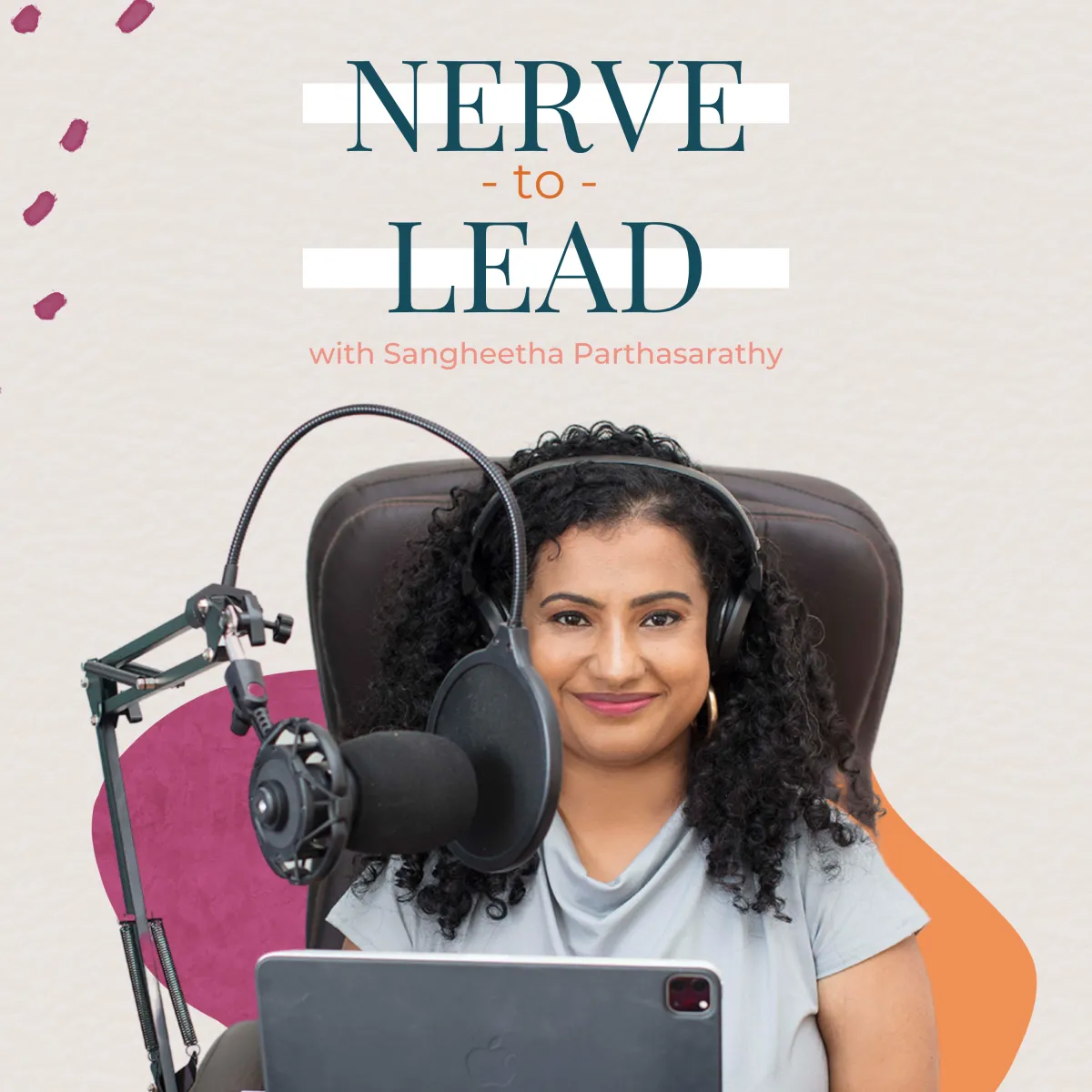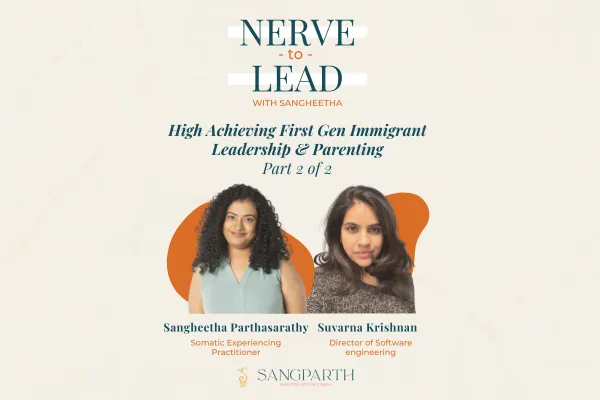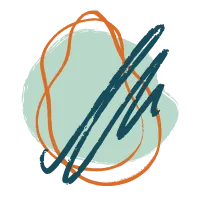The Nerve To Lead Podcast
with Sangheetha Parthasarathy
On The Nerve to Lead podcast, your host, Sangheetha Parthasarathy encourages CEOs, Entrepreneurs, deep thinkers, the round-pegs-in-square-holes, change-makers and visionaries to share their stories of power, pleasure and passion.
We cover everything from nervous system regulation, high achievement, trauma healing, parenting, partnership and attachment, intimacy and more. You will also get to learn the stories and knowledge from our expert guests and thought leaders.

Apply to be a guest on
Nerve to Lead Podcast
Welcome to 'Nerve to Lead' podcast. Apply here to be a guest on the podcast with Sangheetha Parthasarathy.
Invite Sangheetha as a
guest to your podcast
Invite Sangheetha, a Nervous System Coach, Speaker and Consultant to be a guest on your podcast.

High Achieving First Gen Immigrant Leadership & Parenting - Part 2 of 2
EPISODE TRANSCRIPTS
INTRODUCTION
Welcome to the Nerve to Lead podcast. Here we explore power, pleasure, leadership, identity, belonging, parenting, and couplehood, and explore stories of navigating through life, finding both authenticity and attachment through the common lens of the nervous system. I am your host, Sangheetha Parthasarathy and I'm so glad you're here. Welcome back to part two of my discussion with Suvarna Krishnan where we continue discussions around high achievement, diversity, leadership, and most importantly, immigrant parenting.
CHOOSING BITS PILANI
As I progressed, I also had this issue where I was still carrying a lot of baggage about being a high achiever, right. The whole of my upbringing was around, you need to be ambitious, you need to score very good marks or you need to make sure that you land the right job and Yes. Whatever, right. The right college. And it's all about the right university. Yes. So I remember when I finished my 12th standard, I had my medical admissions at a really reputed local university and I had BITS admissions, and I was like, I told my dad I wanna not choose medicine even before I got the admission, but he wouldn't agree with me. So there was this whole drama and chaos, and everybody was convincing me to like join medicine, but I wasn't interested in it. So there's, like, I went to med school and I dropped out after a week. So that also happened. Yeah. So you know, and all of that is how you grew up, right? That is what you were given as a child. That's right. And it's very hard to remove that out of your body and your brain. That's right. Right. And it's ingrained in you. And that was the difficult thing for me as a mom, right?
DIFFICULTIES CONNECTING AS A PARENT
When I had a kid, I had to kind of change the way I thought of ambition or even success or what I stand for. I used to think of myself as this person in a leadership position, as an executive. Yes, I am that now, but my idea of what makes me happy had to kind of switch, right. To be a good mom, or to be a mom, not even like good, just to be a mom. Mm-hmm. I was very uptight initially, and after having a baby, I was like I really couldn't connect. I couldn't have that fun mom and son days. And I'm sure a lot of moms struggle with it. I'm talking about it. I'm not sure if everyone talks about it. I'm glad that we are talking because I want people to know that it's a struggle that everybody has. Yes. And I used to remember my mom, right? And she was a working mom. I can also relate with certain other moms of my peers mm-hmm. right? Mm-hmm. That I've interacted with, and I've been with all of them career moms, right? And I see that pattern mm-hmm. Of, okay, this is not important, right? Like, something's not important for them. But then for the child, or for your relationship with the child, it's probably very important, right? Mm-hmm. but then you, your mind skips that, your mind is thinking, I need to work on this and, make sure that I get it done. And you ignore the child rearing aspect of it. I'm not saying that you should ignore your career to watch your children. I'm just saying there is a balance that we need to get to. And as high achieving career moms, it's something we need to consciously do because of the way we have been taught, right?
SUSPENDING JUDGEMENTS ABOUT HAVING BABIES EARLIER
Mm-hmm. as you know, Asian parenting and Indian parenting, the colonial impact and all of that, like you said, like there is a need to please your employers, and there is a need to also please your children. And you kind of are thinking this is more important, right? Like, I can always do this, but this is more important, right? I need to be a better executive, right? I'm a good mom. Like I'm confident that I'm a good mom, but it's not about being a good mom. It's about enjoying being a mom, right? Mm-hmm. that is what I did not have. Mm-hmm. I realized that early on, and I kind of figured out that I need to work on it. Mm-hmm. I'm not sure if many moms have realized that, you know? Mm-hmm. It's something that people need to look at and see. and I also always thought that early on in my career, I used to think having a family or getting married early is a bad idea, right? Mm-hmm. But then now I have kind of, or even you know, not working is a bad idea. Mm-hmm. I used to think that. Yes, yes. Now I am very understanding of the fact that, you know, it is actually okay, and it's actually even better. I mean, I wish I had a baby earlier, right? Like early on in my career I had a baby because health-wise and body-wise, I would've been able to handle it much better, right? When you're a young mom. There are advantages and disadvantages to everything. Sure. Again, yes, grass is greener on the other side, I guess, but yeah. And I think for everyone, their choice, right?
THE COMMON THREAD THAT CONNECTED MOTHERS IN THE PREVIOUS GENERATION
Yeah. Yeah. And I think you touched on many different aspects here, you said good mom. I think that's a topic for a whole, you know, different conversation. And I just want to kind of touch on a few things here. One is I think, this high achievement prerogative is also closely linked with economic survival, economic independence, and when you're a first generation immigrant mom being raised in high achievement households, I think we are probably the first generation of daughters who were raised by working moms. Mm-hmm. And those that weren't, had mothers that were surviving patriarchy in nuclear setups. I think even in the family, like the mother who stayed at home, like our mothers, you know, you had mothers that worked outside the home, and then you had mothers that didn't. And I think that was the era of real economic, survival anxiety, which showed up regardless of whether the mother worked outside the home or stayed at home, and really impacted the ability for caregivers to provide attunement and nurturing in early caregiving experiences. Mm-hmm. I think it's very common for somebody our age to have mothers that did not feel present and attuned even regardless of whether they were stay at home or not. It's not the face time that they spent, it's actually the emotional time that they spent because the mothers that stayed at home, had this economic survival anxiety to optimize every penny. If they lived in a joint family, it came with gender roles in patriarchy, which was really big trauma in the household, in part driven by that economic anxiety also, and gender roles and patriarchy. What happened there was, I think we are the first generation of daughters that were severely either over mothered or under mothered, or both.
"GOOD" MOTHER OR "GOOD ENOUGH" MOTHER ?
Therefore, we grew up with certain ideas about nurturing and connection which I think, we are one of the first generation, or maybe the second generation, which really internalized and devalued nurturing roles or nurturing as an act. Mm-hmm. Absolutely. I think we are the first generation of women or daughters that internalized this idea that one must be productive in economic terms and that trumps everything else, you know? Yeah. So I think we have, we came internalizing this idea that nurturing, the value of nurturing, attunement, caregiving so we, I think harmfully you know, grew up internalizing this dichotomy that there is either that, like, so if I'm a stay at home mom, I'm a door mat and I'm gonna get crushed by patriarchy, therefore, financial independence is my ticket outta patriarchy, but it isn't, right? Then you grow up and then you realize I think first, you know, it's not a dichotomy. And the second thing is, I think it creates a big impact when you parent, you know, because again, and I'm using parenting and mothering as a verb, not a noun, right? And so when you said good mom, it opened up so much. I think, I don't know if the goal is to actually be a good mom as much as a good enough mom, you know? I think yeah. You know, and redefining what mothering and nurturing and or parenting, to use a gender neutral term means. I think it's true that to be a good or a good enough parent, giving your child a roof over their head and, less economic anxiety and giving them the best access to education and private, you know, all of that, right? Again, survival related and that was always there, right? Like parents were hustling, et cetera. Yeah. But I think we also had a whole village where there was safety. Yeah. And the child could receive secure attachment, not just with one or two caregivers, but an entire community, which provided that nurturing and attunement without de valuing. I think, I wonder if we've lost the ability to really provide that, because early attachment is predicated on feeling safe and not having that pressure to perform.
VISA ANXIETY SHOWING UP IN PARENTING
That's one thing and then the second aspect to that is, as you describe, if you have this high achieving first generation immigrant mom who's worried about visa and always has one foot out the door, always keeps LinkedIn pretty and always is connecting and has plan A, plan B, plan C, plan D, plan E, and the body is tight because we are braced. And when you have a nervous system that is braced for attack or wants to defend in a broad sense, and the living in visa anxiety for 10, 15 years, that is when you generally find love, get married, and start raising a family. Where one or both parental caregiver nervous systems have this hyper vigilance, the brace, the tightness, the meerkat response really gets in the way of nurturing, attunement, creativity, spontaneity, play, most importantly play. I remember that when I became a mom early on, it would feel a little hard for me to really be spontaneous with my daughter, outside of structured activities. And then you're approaching parenting as a teachable moment and all of those things. And so I think, yeah. In the work that we've done together, we've worked on it somatically, right. Because that lives in our bodies, you know what I mean?
Yeah. Yeah. Exactly. I mean, I used to feel the same way.
THE LONGING TO BE A FUN, SILLY MOM
I had, I used to feel like I wanna be spontaneous, but I just, I'm just in this shell, right? And and it's so hard to break out of it. And it was a conscious effort to stay in that shell sometimes, right? Even though like your brain is saying, you know what? You need to play, you need to be more spontaneous. And it was a fleeting thought again, right. It was not, it was not that important. But then as that thought got more and more significant in my head, I decided to work on it, right. I just feel, you know, not a lot of people realize it. I think that's the hard thing here, right? You realize it, you work on it, but if you don't realize it, right. And, and you think, yeah, I mean, I'm good. I've provided for my child, and I have a roof over his head, I'm giving the best food possible, the best kind of education, and I have a big home. And see all of these things will help you justify the fact that you're not in the moment. And it's easy to not care about it. It's easy to ignore it, right and it's easy to ignore that thought. But I think more people should stop ignoring that because that is more significant than everything else. Because that's what the kid's gonna remember.
WHAT EXACTLY IS AT STAKE HERE ?
That's what's gonna shape them as human beings later on, right. That time you spend with them and the quality of time that you spend with them.
Yes. Yeah. Yeah. Absolutely. What made you invest in this work as opposed to other forms of therapy/coaching and, I'll ask it differently. What's the imperative here? What's at stake if we don't do the work?
Yeah. Yeah. So there's a lot at stake. As I said, we are bringing in human beings into this world. We are grooming them, we are taking care of them. We are with them all day long, and they are shaping out and becoming adults in a few years. So it is very important, and it's the responsible thing to do, to make sure that we do everything in our power to be the right kind of coach, the right kind of, I don't wanna say mentor, but you know, for the lack of a better word, mentor and a good parent. I mean yeah. A good enough parent. Safe haven. Right. You know, being their base, safe emotional base. Exactly. And be there and support them. And, and they are going to come to us for guidance. They're going to come to us for help. Especially when I talk about parenting. Yeah. Yeah. And, and there is this important aspect that we need to remember that we cannot pass on our generational trauma onto them. And all of this uptightness and high achievement goals that we had, I had to, there was a shell around me, like I said, right? I had to break out of it. And if I had not done that, I would've actually passed it on to my child, and I would've probably groomed, I will probably groom him to be the same way I was. That is important. And there are people who rely on you too, when you're a leader, right? Not just as a parent, right. When you're in a leadership position, when you're the oldest sibling, for example, right? It could be any kind of leadership position. If somebody's looking up to you as a leader, it's your responsibility to make sure that you don't pass on your baggage to those people who are seeking guidance and mentorship, right? It's the responsible thing to do. If we had not done that work, right, that we did, I would've probably passed on all of my beliefs and thoughts that were part of that whole upbringing that I had, which are in part, I still believe they're not right. And but then I never would've realized that if I had not done the work. And then also making sure that, you know as a partner, right? even as a partner, I had, I used to have this flight or fright type of emotions when there is something wrong, and when we have a big argument or you know, you want to give up on the relationship really quickly, right? And it's, yes, it's the norm. it's still something that people normally do. I think working on yourself is the first step, right? It itself is in some way you're working on the relationship as well by working on yourself. Mm-hmm. and I realized that as well as we did our work. So I think overall, I think it's helped me in a lot of ways, especially being a present parent, spontaneous parent, being a good mentor and a guide, and being mindful of what I say, yeah. So that I think is something that has changed in me and I'm really happy about it.
RESOURCES - DOWNLOAD THE AUTONOMIC SAFETY ASSESSMENT FOR PARENTS
And now a small break to talk about more resources, we have created an autonomic safety assessment for parents, which helps baseline our co-regulation capacity, which is available for free to download and use. It is available as a link on the episode show notes. Now back to our conversation.
IS COACHING/THERAPY AN EXPENSE OR INVESTMENT ?
Talk to us about investing in personal work. Because I think as first generation immigrants, sometimes, you know, we come with various levels of economic survival related energy in the body, and then we may find it really hard to justify or come up with an ROI to invest in ourselves, because it's not the MBA that will get you a piece of paper right? I mean, this is internal, and of course, you know, if people see the impact of it, et cetera. And you know, there is also this recession looming and layoffs looming. So talk to us about the decision to invest in the personal growth and from an economic/ROI kind of decision making.
As I said, our ever changing economic situation, right? And there is immigration changes, there is visas, there is work, there is all of these things happening around you. At the click of a finger, we had to all go into a lockdown. And that itself has like, cost a lot of, you know, anxiety, and it's only getting worse, right? That anxiety's only getting worse and you've not worked on it for all these years. And, and now there is a new set of changes happening, and I think it's very important that people prioritize themselves first, right? Yeah. And be it anybody like women, minority and immigrants, and be it anybody, especially immigrants, especially immigrant women, I think there is a lot of trauma to unwind and yes, unload. And whether or not they accept it, that is the situation So I definitely think that it's worth every penny, yeah. To invest in yourself. And I've personally benefited from doing it too, so, mm-hmm.
Mm-hmm. So, yes. And I think, yeah, you're right. I think as you said, the fight or flight can only get you so far, Yes, exactly.
I mean, right. And how long can you be in that, right? Mm-hmm. Yeah. It's exhausting. It's exhausting honestly.
Mm-hmm. Yeah. And I think in my clientele, which tends to be first generation South Asian immigrants, the real impact of having been in this fight or flight for years, and I'm talking 10, 15, 20 years I see it somatically, I see it a lot. Panic attacks, trips to the ER, Yeah. Being signed off of work and on the extreme end, you know, people like 40 year olds just sort of dropping dead on their desks. \
THE ROI OF INVESTING IN YOUR NERVOUS SYSTEM ?
So what's the ROI of that? You know, and we tend to quantify this as an external, I don't know, certificate, like, oh, half a million for an Ivy League degree. Great. And then I'm also thinking, you know, investing in personal growth and sustained personal growth with the right kinda person over a period of time, is actually a pretty minuscule percentage of the family income, right. If you think of a South Asian, we're talking, annual family income of, I don't know, somewhere between half a million and a million or above and then we are talking about budgeting for self-growth. That's I think I don't know, $10,000 is like a minuscule percentage of the overall pie. Yeah. And then, you know, what's that worth to you like. Exactly.
I think investment in therapy is new. It's a new concept for immigrants, and white people have been going for therapy for years, mm-hmm. and they've been paying for therapy for years. And we are at a place where at least today immigrants have grown to a place financially where they can actually pay for therapy and get the help that they really, really need, right? Mm-hmm. and it's not a lot, if you think about it, right? Considering the number of sessions you'll have to go, mm-hmm. and, you know, every session an average white person goes is probably a $100, $200 per session. Oh far more, I think. far more, yeah.
So that's, I mean, depending on, like for somatic work, yeah. If you're in the coast, you're paying $350 to $400 an hour.
$400 per hour. Yeah. Yeah. So again that again, depends on what kind of therapy and everything, and so when an average therapist charges you whatever amount, and it's necessary, right. And we've seen how I think I'm really appreciative of the fact that the white population has actually embraced it so well, and they're treating it as part of life and yeah. You know, it's important, inner growth is important, and a lot of the people are breaking stereotypes. I'm glad that demographic is actually working on it. And it's a really significant and important for other demographics like immigrants and black people to actually do this, right? And not because they need to learn about it like the other demographic, but because they need to do the work to, you know, come out of that trauma, right? Yeah.
Yeah. And I think trauma is cultural. Therefore healing also needs to be. You know? I think and it's not to say that, you know, black people should go to black therapists, or brown people should go to brown therapists. But especially in somatic work, what makes healing possible is nervous system to nervous system safety, neuroception of safety. So if I'm the therapist, you're the client, your nervous system, before I've even said a word, has neurocepted, built an unconscious judgment as to whether this person is biologically safe or not. And that neuroception is always in the background. Yeah, my voice, the way I speak, the language, my intonation, all of these things. And so I think it's very important to find somebody there's a gut level sort of instinct about, I can trust this person, I feel safe with that person to be mirrored and held, for my nervous system to be held by this nervous system, you know? And that is a very largely unconscious, but extraordinarily precise and complex calculation that your nervous system is doing behind the background. And that's neuroception and that is not perception, that's not cognitive, but that is neuroception and it's a biological function. It doesn't lie, Yeah, right. And I think that's where the cultural competence and lived experiences and safety and being very, very precise and nuanced about working with this population, I think that's what shifts it, especially somatically.
Exactly. Yeah.
CHOOSING THE RIGHT KIND OF HELP
What should one look for between, you know, a high achiever, first generation immigrant mom and you want to seek therapy, coaching personal growth. How would you go about that process? I mean, how did you go about that process?
What about the work? The work kind of made you choose this, you know, come to me.
So there are a few reasons why I came to you. You are also a brown immigrant and Indian. Yes. And yes. So that is one of the main reasons why I chose to work with you. And I think there were a lot of aspects that were overlapping, again high achieving mom, immigrant, brown Indian. So all these things kind of overlapped. And I felt like I needed somebody who will know me, who will understand what I'm talking about. And I think that's very important in therapy, right? And to be able to connect the right way, right? There are different kinds of therapies, right? Like obviously, we did somatic work. The somatic work is all about mind and body and all of that. And you need to believe in that a little bit to be able to get there. Oh yeah. Absolutely. And that, again, that is a process. So I think for me the fact that I had a trustworthy person that I can relate to was one of the main criteria, right. And I'm sure a lot of brown women can benefit from this program that you have. And I believe that. And again, obviously it's something that everybody has to connect with and figure it out.
CLOSING AND END CREDITS
Yes. Thank you so very much. It's been a pleasure. Sure. And, thank you so much for spending time and Talking to us.
Sure. It was a pleasure. Thank you very much.
Thank you for joining me today on Nerve to Lead Podcast. The music you hear in this podcast was created by Sound Creed. You can find their link in the description. Thank you to Vaishnavi and Pavithra in team Sangparth for producing and editing this podcast. Did this episode resonate with you? If it did, please share it with your friends, family, coworkers, or clients. We would also love to hear from you. Drop us a note on www.sangparth.com
What we offer
Our Areas Of Focus

Career, Entrepreneurship& Leadership

Sex, Relationships
& Parenthood

Eating, Movement &
Body Image

